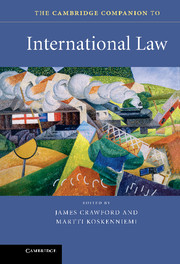Book contents
- Frontmatter
- Contents
- Preface
- Notes on contributors
- Introduction
- Part I The contexts of international law
- Part II International law and the state
- Part III Techniques and arenas
- Part IV Projects of international law
- 12 Constituting order
- 13 Legitimating the international rule of law
- 14 Human rights in disastrous times
- 15 Justifying justice
- 16 Regulating trade, investment and money
- 17 Divided against itself
- 18 Conserving the world’s resources?
- Guide to electronic sources of international law
- International law chronology
- Select guide to further reading
- Index
- References
13 - Legitimating the international rule of law
from Part IV - Projects of international law
Published online by Cambridge University Press: 05 July 2015
- Frontmatter
- Contents
- Preface
- Notes on contributors
- Introduction
- Part I The contexts of international law
- Part II International law and the state
- Part III Techniques and arenas
- Part IV Projects of international law
- 12 Constituting order
- 13 Legitimating the international rule of law
- 14 Human rights in disastrous times
- 15 Justifying justice
- 16 Regulating trade, investment and money
- 17 Divided against itself
- 18 Conserving the world’s resources?
- Guide to electronic sources of international law
- International law chronology
- Select guide to further reading
- Index
- References
Summary
Meaning of the ‘rule of law’
The ‘rule of law’ signifies that all persons (natural or juridical), including organs of the state, should comply with laws adopted through prescribed constitutional procedures. Its essence is the prohibition of the exercise of arbitrary power. The scope of the rule of law includes the procedural guarantees of general laws and an ‘impartial’ due process (Neumann 1985, 265–267; Sypnowich 1990, 55). It has also come to be associated with the protection of core human rights. But despite a certain common understanding, the rule of law ‘is an exceedingly elusive notion’; ‘contrasting meanings are held’ by reasonable people (Tamanaha 2004, 3). There are several reasons for this.
First, the differences can be traced to the use of a positivist as against a deliberative conception of law. The validity of a legal rule is usually traced to adherence to a prescribed procedure, most often laid down in a written constitution. But as Jürgen Habermas points out, rules based only on positive enactment may sometimes lack legitimacy for ‘the belief in legality can produce legitimacy only if we already presuppose the legitimacy of the legal order that lays down what is legal. There is no way out of this circle’ (Habermas 1987, 265). Legitimacy can be secured only if both particular laws and the legal order are justified by good arguments as opposed to drawing strength from compliance with formal processes or being the outcome of the mere exercise of power. Thus if the legal order is based on some originating violence, as it often is, the legitimacy of legal rules tends to be undermined (Derrida 1992, 6). This is of particular relevance when the relationship between colonialism and international law is explored. Habermas’ understanding of the rule of law is however a regulative ideal. The extent to which it is complied with will bestow a greater or lesser degree of legitimacy on the legal order.
- Type
- Chapter
- Information
- The Cambridge Companion to International Law , pp. 290 - 308Publisher: Cambridge University PressPrint publication year: 2012
References
- 28
- Cited by



